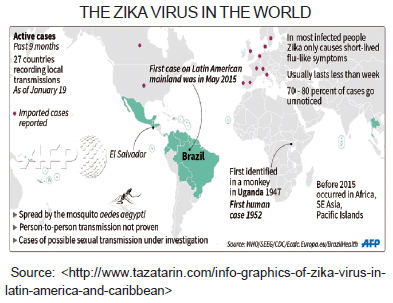O TEXTO 2, como um todo, tem por objetivo
primordial mostrar:
O TEXTO 2, como um todo, tem por objetivo primordial mostrar:

O TEXTO 2, como um todo, tem por objetivo primordial mostrar:


TEXT 1
Houston’s Poor Neighborhoods Could Be Prime Zika Real Estate
The World Health Organization (WHO) has warned of the potential for the explosive spread of the Zika virus through the Americas. Margaret Chan, the director of the WHO, advised that the Americas could be hit by 4 million cases of Zika this year. The outbreak of Zika virus now centered in Brazil has been linked to a sudden increase in severe birth defects including microcephaly, babies born with smaller heads and brains. The National Public Radio – USA (NPR) recently reported that other neurological problems, such as babies born blind, may also be linked to Zika. Researchers do not fully understand Zika or have not yet proven causality, but the circumstantial evidence connecting the Zika outbreak to the sudden, large increase in birth defects is very strong.
Reports quoted experts who said that Zika was a low risk to the United States because the U.S. doesn’t have the poverty and high population densities that have caused the explosive spread of Zika in Brazil. However, Dr. Peter Hotez, a tropical disease researcher who lives in Texas, has warned that poverty and high population density makes Houston highly vulnerable to a Zika outbreak. He warned that the whole Mexican Gulf coast is already sufferingfrom increasing levels of tropical diseases spread by mosquitoes, in particular dengue fever. Because Zika virus is related to dengue fever and has the same mosquito vector, the expansion of dengue in the Gulf coast region is a good indicator of the potential spread of Zika virus
Adapted from: <http://www.democraticunderground.com/
112796307>
TEXT 1
Houston’s Poor Neighborhoods Could Be Prime Zika Real Estate
The World Health Organization (WHO) has warned of the potential for the explosive spread of the Zika virus through the Americas. Margaret Chan, the director of the WHO, advised that the Americas could be hit by 4 million cases of Zika this year. The outbreak of Zika virus now centered in Brazil has been linked to a sudden increase in severe birth defects including microcephaly, babies born with smaller heads and brains. The National Public Radio – USA (NPR) recently reported that other neurological problems, such as babies born blind, may also be linked to Zika. Researchers do not fully understand Zika or have not yet proven causality, but the circumstantial evidence connecting the Zika outbreak to the sudden, large increase in birth defects is very strong.
Reports quoted experts who said that Zika was a low risk to the United States because the U.S. doesn’t have the poverty and high population densities that have caused the explosive spread of Zika in Brazil. However, Dr. Peter Hotez, a tropical disease researcher who lives in Texas, has warned that poverty and high population density makes Houston highly vulnerable to a Zika outbreak. He warned that the whole Mexican Gulf coast is already suffering from increasing levels of tropical diseases spread by mosquitoes, in particular dengue fever. Because Zika virus is related to dengue fever and has the same mosquito vector, the expansion of dengue in the Gulf coast region is a good indicator of the potential spread of Zika virus.
Adapted from: <http://www.democraticunderground.com/
112796307>
TEXT 1
Houston’s Poor Neighborhoods Could Be Prime Zika Real Estate
The World Health Organization (WHO) has warned of the potential for the explosive spread of the Zika virus through the Americas. Margaret Chan, the director of the WHO, advised that the Americas could be hit by 4 million cases of Zika this year. The outbreak of Zika virus now centered in Brazil has been linked to a sudden increase in severe birth defects including microcephaly, babies born with smaller heads and brains. The National Public Radio – USA (NPR) recently reported that other neurological problems, such as babies born blind, may also be linked to Zika. Researchers do not fully understand Zika or have not yet proven causality, but the circumstantial evidence connecting the Zika outbreak to the sudden, large increase in birth defects is very strong.
Reports quoted experts who said that Zika was a low risk to the United States because the U.S. doesn’t have the poverty and high population densities that have caused the explosive spread of Zika in Brazil. However, Dr. Peter Hotez, a tropical disease researcher who lives in Texas, has warned that poverty and high population density makes Houston highly vulnerable to a Zika outbreak. He warned that the whole Mexican Gulf coast is already suffering from increasing levels of tropical diseases spread by mosquitoes, in particular dengue fever. Because Zika virus is related to dengue fever and has the same mosquito vector, the expansion of dengue in the Gulf coast region is a good indicator of the potential spread of Zika virus.
Adapted from: <http://www.democraticunderground.com/
112796307>





